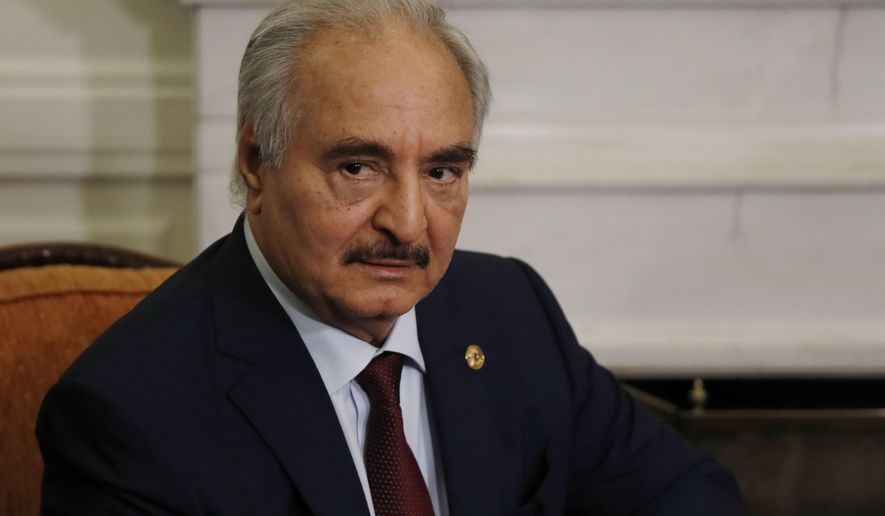DUBAI, United Arab Emirates (AP) - Libya’s commander who rules the eastern half of the country and who was behind a year-long military attempt to capture the capital, Tripoli, said Friday that oil production would restart soon, ending a months-long blockade of the nation’s vital oil fields.
The Tripoli-based National Oil Corporation, however, appeared skeptical earlier on Friday, and previous attempts to end the crippling oil blockade have broken down.
The commander, Khalifa Hifter, promised in a televised address that oil would start pumping again for the first time since January “with conditions that ensure a fair distribution of revenue.”
His spokesman, Ahmed al-Mosmari, said the breakthrough stems from a “Libyan-Libyan dialogue” led by Ahmed Matiq, the rival Tripoli government’s deputy prime minister, seeking to resolve the oil paralysis and create a new mechanism to distribute the country’s petrodollars more equitably.
“We are ready to open oil fields to secure the future of Libya for a period of one month,” he said.
Since Libya descended into chaos following the 2011 uprising that ousted and killed longtime dictator Moammar Gadhafi, the North African country has been split west to east. A U.N.-supported administration in Tripoli, propped up by Turkey, holds sway over the west. Hifter, backed by Russia, Egypt and the United Arab Emirates, controls the east and south, including the country’s major oil fields and terminals.
The U.N. has been trying to steer the rival sides toward peace talks aimed at ending their years-long conflict. Diplomatic efforts gained traction after Hifter’s campaign to capture the Libyan capital failed in June and the Tripoli-based militias, backed by Turkey, turned the tide of war.
The two sides agreed on a preliminary deal earlier this month that would include elections within 18 months and a demilitarization of the contested city of Sirte, controlled by Hifter and the gateway to Libya’s major oil fields and export terminals.
Earlier Friday, the head of the Tripoli-based National Oil Corporation issued a statement indicating the resumption of oil production was less certain. The company had apparently been excluded from the back-door talks between Matiq and Hifter’s allies.
Mustafa Sanallah said the corporation would not lift force majeure, a legal maneuver that lets a company get out of its contracts because of extraordinary circumstances, until Russian mercenaries leave the oil fields and export terminals. Sanallah rejected what he called “secret” and “disorganized negotiations” aiming to undercut an internationally-brokered political process to reopen the fields.
Libya’s highly prized, light crude has long been a factor in its civil war, as rival militias and foreign powers jostle for control of Africa’s largest oil reserves.
Powerful eastern tribes loyal to Hifter first seized control of the oil fields in January, cutting Libya’s 1.2 million barrels a day to a trickle and starving the country of badly needed cash, to protest the distribution of revenues to the east and the alleged corruption of Libya’s Tripoli-based Central Bank, through which oil proceeds flow.
The blockade has deprived the National Oil Corporation of nearly $10 billion in revenue and led to nationwide fuel shortages. Power outages have piled on misery for millions of Libyans struggling to cope with a dire coronavirus outbreak and gutted infrastructure, triggering street demonstrations that have intensified pressure on the parties to reach a deal.
Matiq said the decision to “immediately” reopen Libya’s fields and ports came as part of an economic settlement over revenue, involving a joint committee to form a budget, transfer funds and mediate financial disputes between the rival factions. He did not address the scores of Russian mercenaries from Wagner, a Kremlin-linked private security company, stationed across oil fields that the National Oil Corporation says remain a barrier to the resumption of exports.
The secret talks between Matiq and Hifter’s representatives come just days after Hifter’s key rival, Prime Minister Fayez Sarraj of the Tripoli-based government, announced he would hand over power to a new administration in October. There was no formal announcement from the Tripoli-based administration about the deal to reopen contested oil fields, suggesting that Matiq may be positioning himself to exploit the void once Sarraj resigns.
Meanwhile, the U.N. is pressing ahead with political talks between rival delegates, set to resume soon in Geneva. But Russia and Turkey, power brokers on opposite sides of the conflict, have mounted their own diplomatic efforts to forge a political agreement and held separate consultations this week in Ankara.
In Istanbul on Friday, Turkish President Recep Tayyip Erdogan expressed regret that his ally Sarraj would soon be stepping down.
“To receive such news was saddening for us,” he said. “Through our intervention … Sarraj and his team … were able to evade what I may call (Hifter’s) invasion.”
___
Associated Press writer Suzan Fraser in Ankara, Turkey, contributed to this report.




Please read our comment policy before commenting.